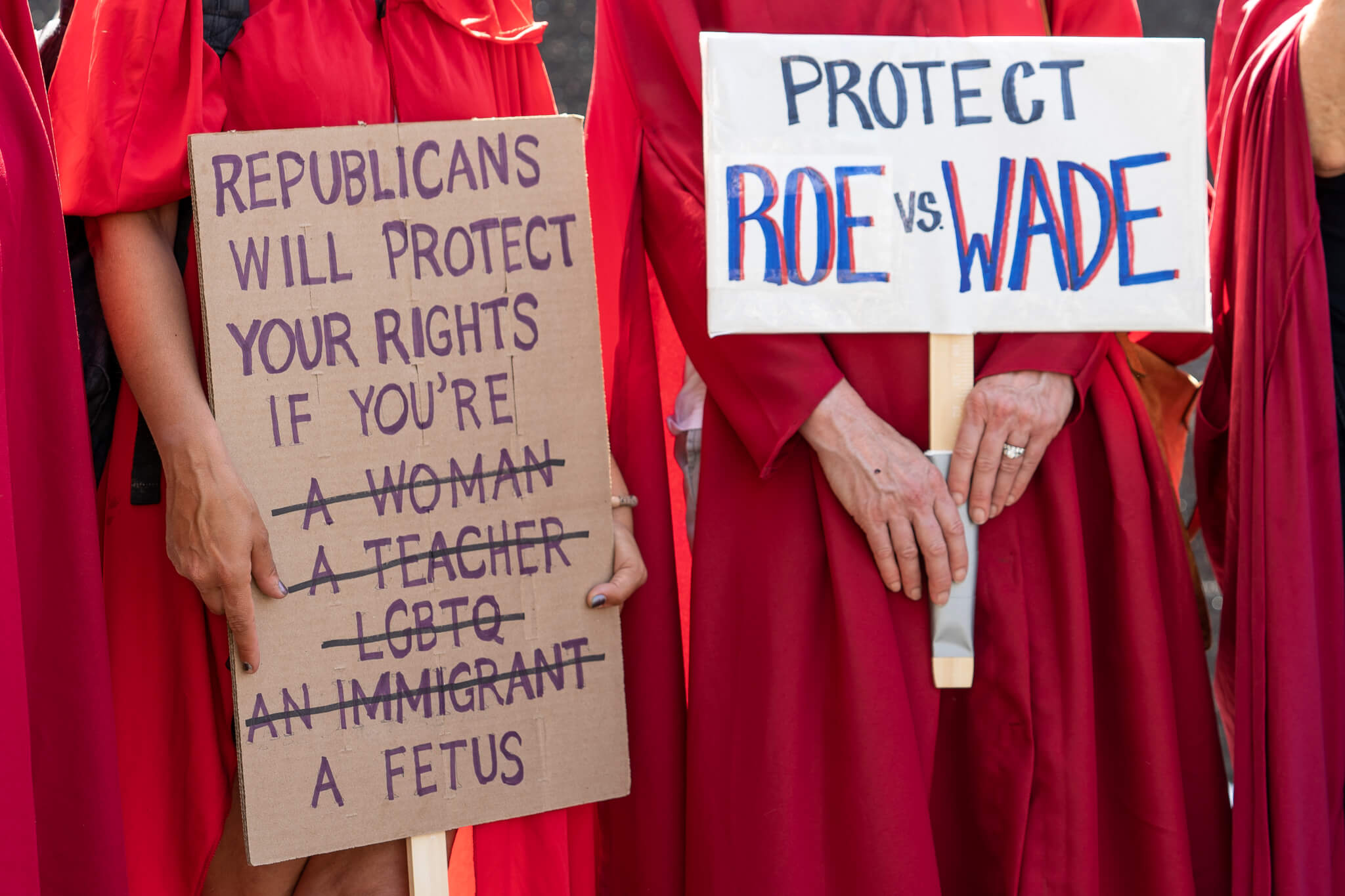
Women dressed as handmaids demonstrate against the infringement of reproductive rights as they join abortion-rights protesters at a rally in Los Angeles City Hall, Saturday, May 14, 2022. (AP Photo/Damian Dovarganes)
If Amendment 30 gets passed by the General Assembly, the future of abortion access for Virginians could become even more limited, even as uncertainty around the topic keeps swirling around.
On Friday, Virginia’s lawmakers will once again reconvene in Richmond to discuss and potentially vote on 38 proposed changes to Virginia’s budget in amendments proposed by Republican Gov. Glenn Youngkin for the commonwealth’s two-year budget plan. The current budget plan is set to expire at the end of the month.
Included in those 38 proposed changes is Amendment 30, which would restrict state taxpayer funds being used for abortion services, even in cases of nonviable pregnancies. Essentially, it is a proposed Hyde Amendment for Virginia, where federal funds are prohibited from being used for abortion services except in the case of rape, incest, a mother’s life being at risk, and for women who have a fetus with a “gross and totally incapacitating physical deformity or with a gross and totally incapacitating mental deficiency,” as per section 32.1-92.2 of Virginia’s State Code.
In Youngkin’s proposed amendment, Medicaid-eligible individuals would not be able to use state funding for a nonviable pregnancy, effectively causing them to endure a potentially traumatic birthing experience. Under the proposed amendment, funding for abortions that meet criteria for section 32.1-92.2 would also not be available, even if a licensed medical provider has given the devastating diagnosis to a family, and the family does not wish to carry the pregnancy to term.
The explanation for the amendment is as follows: “This amendment prohibits any funding in the budget from being used for abortion services unless otherwise required by federal law.”
Amendment 30 would also directly impact low-income Virginians who rely on programs like Medicaid for their health. Many low-income Virginians are people of color, or people who live in rural regions where healthcare services aren’t readily available.
Youngkin’s budget changes were released on the same day a Washington Post article about Dr. Colin Greene, who was Youngkin’s pick to be Virginia’s State Health Commissioner, was released. In the article, Dr. Greene said that racism is a “politically charged” word that “will alienate White people and undermine the state Department of Health’s mission to protect the health and well-being of all Virginians.”
Under the proposed amendment change, roughly 40% of Virginians who identify as something other than White could be potentially impacted, unable to use a lifeline to help them in the midst of a potential reproductive health crisis.
If passed, the amendment could also be a peek into the future of what abortion services could look like in the commonwealth, even though for the time being, abortion will remain safe and legal in the Commonwealth. This will also stand true if Roe v. Wade is overturned.

VIDEO: Your support matters!
Your support matters! Donate today. @vadogwoodnews Your support matters! Visit our link in bio to donate today. #virginianews #virginia #community...

Op-Ed: Virginia’s new Democratic majorities pass key bills to improve your lives, but will Youngkin sign them?
The 2024 Virginia General Assembly regular session has wrapped up. It was a peculiar session from the outset, with Democratic majorities in the...

Op-Ed: Why Virginia Needs A Constitutional Amendment Protecting Reproductive Freedom
Virginia’s recent election season in 2023 drew in eyes from all over the country. Reproductive freedom was on the line and Virginia remained the...

From the state rock to the state flower, here’s how Virginia got its symbols
Have you ever wondered why the Dogwood is the state flower? Or how the cardinal became the state bird? We’re here to answer those questions and more...

VIDEO: Second-gentleman Douglas Emhoff gives speech on reproductive freedom
Second gentleman, Douglas Emhoff touched on reproductive freedom not only being a woman's issue but "an everyone's issue" during the Biden-Harris...

Glenn Youngkin and the terrible, horrible, no good, very bad night
Election Day 2023 has come and gone, and while there are votes to be counted, one thing is perfectly clear: Virginians unequivocally rejected Gov....





